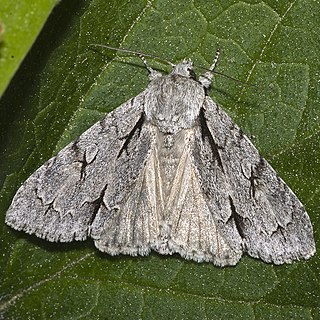
The grey dagger is a moth of the family Noctuidae.

Panonychus ulmi, the European red mite, is a species of mite which is a major agricultural pest of fruit trees. It has a high reproductive rate, a short generation time and produces many broods in a year, all of which contribute to its pest status. It has a cosmopolitan distribution, and a very wide host range, having been found on the following plants:

Lomographa temerata, the clouded silver, is a moth of the family Geometridae. The species is found in Asia and Europe and was first described by Michael Denis and Ignaz Schiffermüller in 1775.

Coleophora spinella, the apple-and-plum casebearer, is a moth of the family Coleophoridae. It is found in Europe, the Near East and North America.

Coleophora anatipennella is a moth of the case-bearer family (Coleophoridae).
Stigmella oxyacanthella is a moth of the family Nepticulidae, found in Europe and North America. The larvae are leaf miners feeding inside the leaves of trees and shrubs, such as hawthorn, apple and pear.
Stigmella sorbi is a moth of the family Nepticulidae, described by Henry Tibbats Stainton in 1861. It is found in most of Europe, east to the eastern part of the Palearctic realm.

Leucoptera malifoliella, the pear leaf blister moth, ribbed apple leaf miner or apple leaf miner, is a moth of the Lyonetiidae family that can be found in all of Europe.
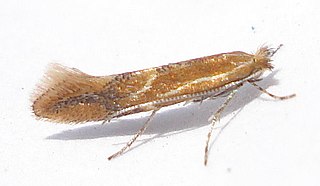
Phyllonorycter corylifoliella, the hawthorn red midget moth, is a moth of the family Gracillariidae. It is found in all of Europe.

Phyllonorycter mespilella is a moth of the family Gracillariidae. It is found from Germany to the Iberian Peninsula, Sardinia, Italy and the Carpathian Mountains and from Ireland to southern Russia. It also occurs over much of western North America, from California north to British Columbia, and east to Utah and New Mexico.

Phyllonorycter sorbi is a moth of the family Gracillariidae. It is known from all of Europe, except the Balkan Peninsula.

Phyllonorycter crataegella, the apple blotch leafminer, is a moth of the family Gracillariidae. It is known from Canada the United States.
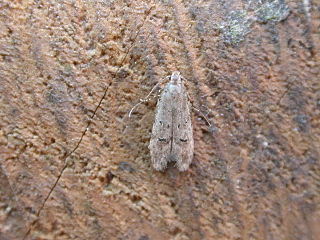
Teleiodes vulgella is a moth of the family Gelechiidae. It is known from most of Europe, east to the southern Ural and the Volga region.
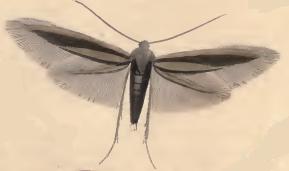
Coleophora violacea is a moth of the family Coleophoridae. It is found from Fennoscandia to the Pyrenees, Italy and Hungary and from Great Britain to Russia.
Coleophora trigeminella is a moth of the family Coleophoridae. It is found in most of Europe, except Ireland, the Balkan Peninsula and the Mediterranean islands.

Coleophora siccifolia is a moth of the family Coleophoridae. It is found in most of Europe.

Coleophora prunifoliae is a moth of the family Coleophoridae. It is found from Scandinavia to the Pyrenees, Italy and Romania and from Great Britain to southern Russia.
Coleophora tadzhikiella is a moth of the family Coleophoridae. It is found in Tajikistan.
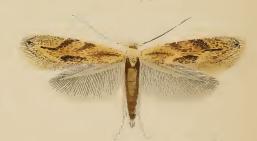
Bucculatrix bechsteinella is a moth of the family Bucculatricidae. It was described by Johann Matthäus Bechstein and Georg Ludwig Scharfenberg in 1805. It is found in most of Europe, except Greece and Bulgaria.
Anacampsis obscurella is a moth of the family Gelechiidae. It is found in most of Europe, except Ireland, Great Britain, the Netherlands, Portugal, Denmark, Fennoscandia, the Baltic region, Poland, Switzerland, Slovenia and Croatia.









